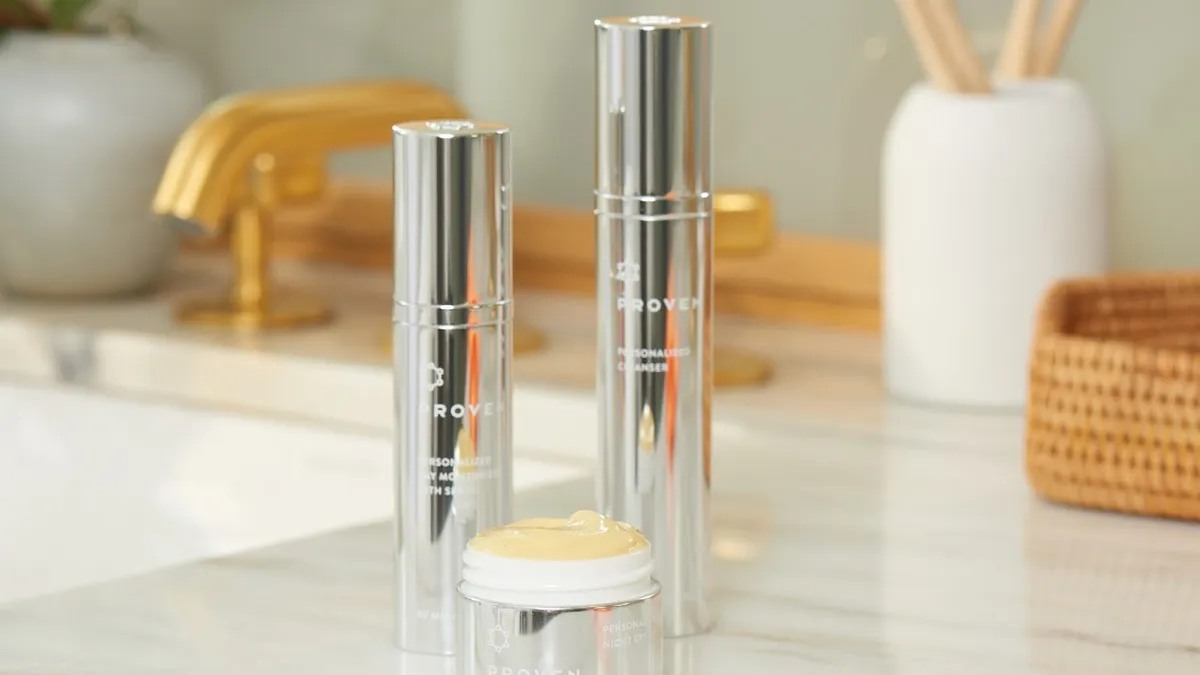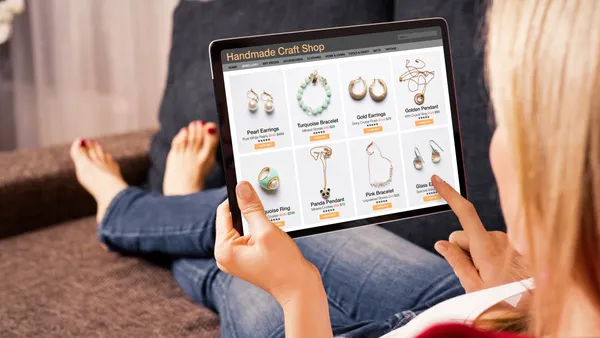Beauty has been one of retail's hottest markets for years. As of Sept. 15, beauty and personal care startups raised over $2.9 billion in funding this year, according to CB Insights. Crunchbase data shows just $1.9 billion raised in the space this year, but that's significantly up from 10 years ago when the beauty space brought in $402 million.
As with fashion, beauty is cyclical. Makeup, for example, has been in a downcycle for years, and the pandemic hasn't helped that, with many shoppers continuing to invest in their skin care routines especially last year as they largely stayed home. Those macro trends impact what kind of products a customer buys and how many of them.
Shopper preferences for one product over another might also shift depending on any number of factors, from skin changes to the simple desire to try something new. Over the past few years, though, a whole host of companies (including Function of Beauty, Proven Skincare and Atolla, among others) have begun cropping up with the aim of creating beauty products so customized that shoppers will never need to change.
"I think that the definition of beauty and self-care is growing and evolving. I think before maybe different things told us, 'This is what you need. This is the best thing for you. This is the only thing that's working for you,'" Tari Kandemiri, founder and CEO of Hama Beauty, a personalized beauty platform that recommends products to shoppers, said. "And then now we're realizing you can kind of tailor certain aspects of the beauty process."
In part, Kandemiri blames the "plethora of options" in the beauty space that can make it harder for customers to find what they need. In addition to being overwhelming for customers, it also requires a lot of effort on the part of a shopper to understand the ingredients and the effects of certain products.
"It's like, 'Okay, there's actually too many things out there, and I just want to know what's good for me, so I can spend my money wisely, so I can do what feels right for me,'" Kandemiri said.
Effectively tailoring products may help answer some of the frustrations customers have, but it also takes a lot of work on the back-end, from analyzing data to asking customers the right questions and, in the case of some startups, reframing the entire manufacturing process around creating personalized products. What does that mean for its potential to scale?
The market for personalized beauty
At their core, customized beauty products are based on the proposition that data can either help a customer find a better product or can create a better product for them than they can find on their own. For Proven, which focuses on creating a personalized skin care routine for customers, it includes collecting around 47 factors about a shopper and running those through its skin genome database, co-founder and CEO Ming Zhao told Retail Dive.
The database itself consists of data from over 4,000 scientific studies and more than 28 million customer reviews encompassing over 100,000 products and 20,000 ingredients. The "Skin Genome Project," as Proven calls it, was inspired by similar databases for music at Pandora and film at Netflix.
"Basically the known universe of beauty and skin care knowledge has been ingested and analyzed by our database," Zhao said.
Layered on top of that is an online diagnostics questionnaire customers fill out, which replicates how a dermatologist would conduct an evaluation. The form generates different questions depending on how a customer answers the preceding ones and eventually separates them into one of more than 60,000 subgroups. Then, the customer's formula is made.
"You're asking me what the total addressable market is — it is as large as the overall skin care, beauty, wellness and personal care markets are. It's all going to be personalized, and it should have been already."

Ming Zhao
CEO and co-founder of Proven
According to Zhao, Proven is now the largest personalized skin care brand in the industry, with over 100,000 customers, 70% of whom are repeat shoppers. Zhao says that is 20 times the industry average for repeat beauty purchases.
"You're asking me what the total addressable market is — it is as large as the overall skin care, beauty, wellness and personal care markets are," Zhao said. "It's all going to be personalized, and it should have been already."
Proven is far from the only brand that's aiming to capitalize on the growing demand for customized products. Function of Beauty, another player in the space, made a name for itself by creating personalized hair care products and has since moved into the skin care and body care spaces as well. In fact, Function of Beauty just acquired another competitor in the custom skin care market, Atolla, to improve its offering.
The segment has seen "significant growth" for years, according to Manola Soler, director of the consumer and retail group at Alvarez & Marsal.
"As consumers continue to prioritize ingredients and product efficacy, there is reason to believe there is significant upside in personalization in the beauty space," Soler said via email. "The rate at which companies can scale will likely be constrained at this point by their ability to develop flexible and scalable manufacturing processes that can ramp up or down as demand naturally fluctuates."
Kandemiri's platform, Hama Beauty, is focused on a less complex answer to receiving personalized products. Rather than creating her own products to match customer's needs, Kandemiri pairs customers with products that already exist based on their answers to a series of questions, including age and skin tone. Customers also enter, in their own words, what kind of needs they're trying to address.
"It was like, 'Okay, you can have these six problems with your skin and then nothing else.'"

Tari Kandemiri
Founder and CEO of Hama Beauty
That last point was particularly important to Kandemiri, as many similar offerings give customers a range of choices but don't allow them to explain for themselves.
"They would have like three options or six options of skin problems or things that you could need help with, like acne, hyperpigmentation, sun protection, but it just felt like it was kind of limited," Kandemiri said. "It was like, 'Okay, you can have these six problems with your skin and then nothing else.'"
After a customer responds to the quiz, the platform isolates the number of products available based on the specific age, skin tone and other personal information a customer gives. Then it works to provide a list of possible products that address the unique needs they entered.
"They entered hyperpigmentation or they entered redness: What are people like them saying about products for redness or hyperpigmentation? Which products are most highly rated, which are kind of the best rated for that specific profile?" Kandemiri said of the process.
Customers can also filter by price and brand — Hama Beauty has more than 400 brands represented on the site and "thousands" of products, according to Kandemiri. It's meant to provide a solution to the "overwhelming" amount of beauty products customers have to choose from without making them do all the work themselves.
Both Kandemiri and Zhao said their businesses were founded based on personal experiences that made it difficult to find the right products. But the customized approach may be more broadly applicable. Kenya Watson, an intelligence analyst at CB Insights, expects a large subset of customers to be interested in personalized beauty products over the long term, as they take some of the friction out of the shopping process. (The firm also put the sophistication of customized beauty products as one of its top trends to watch for this year.)
"I think personalization [up] to this point — most of it has been at the consumer quizzes level, and brands and retailers are trying to figure out how to get past that point," Watson said.
The path to scale
There is certainly interest in the market, and not just from consumers. According to data PitchBook sent to Retail Dive, investment in the personalized beauty market (by dollar amount) has grown eight out of the 11 years between 2010 and 2021. The number of deals in the space has also grown, for the most part, though that metric peaked in 2019.
In 2021 so far, the personalized beauty space has raised $1.04 billion, according to PitchBook. That's compared to a total of $1.7 billion the beauty industry as a whole has raised. Out of 146 total deals in the beauty space this year, 93 have been dedicated to the personalized beauty market in particular, according to PitchBook's data.

That suggests the investor interest is there. And Zhao firmly believes that personalized beauty products are just getting started. In fact, Zhao thinks "everything that touches our body" needs to be personalized, from personal care to wellness. To that point, the company has plans to expand into hair care, baby care, body care, color cosmetics and supplements.
"I actually think personalization is late," Zhao said, adding that in medicine we take a personalized approach to treating our organs. "If you had an issue with your kidneys, you wouldn't say, 'Let me go to the drugstore and buy the most popular kidney medication' because personalized medicine is just the default way that medicine is practiced. And that is done for any organ in your body. That's just expected. So why then for our skin, which is the body's largest organ, why is that not already personalized?"
Even if beauty products should ideally be personalized for a customer, there are a lot of factors that go into running a profitable business when the products are unique for every shopper. Number one on that list is manufacturing at an affordable price.
"While there is an ongoing customer desire for personalized products, there is still significant investment required to enable efficient manufacturing of personalized goods. Whether through incremental manual labor or through automated facilities, the cost of creating personalized goods is still significant," Soler said. "Another challenge in continued growth is consumers' desire for immediate gratification – personalized goods typically have longer delivery lead-times which may limit their audience, especially around peak demand periods."
Watson agreed that companies that can "crack the code" on efficient manufacturing will gain the upper hand in the space, and also added that it gets harder to create custom products at scale versus for a smaller subset of customers. Atolla, Function of Beauty's new acquisition, is managing this relatively well, she said.
Proven had to "reinvent" manufacturing in order to achieve any kind of scale, Zhao said. Currently, the brand uses predictive analytics to plan for what products it will likely need in the coming months and adjust manufacturing according to that.
Similar challenges make entering physical retail tougher. Proven is working on some different ways to approach the physical retail experience, but it takes serious innovation since personalized beauty companies can't just package up their products and sell them like other brands.
Soler noted a couple of players that have tweaked their offerings to better suit physical retail and efficiency, including Clinique ID and Function of Beauty. Clinique ID gives customers a choice between six base moisturizers and nine concentrate cartridges to address specific concerns, while Function of Beauty tweaked its offering for Target to include four base formulas customers can choose from and 10 "hairgoal booster shots" they can add in, Soler said.
Fixing the manufacturing problem is doubly important as it also impacts the price of a customized product. The more expensive it is to manufacture the goods, the more the brand has to charge a consumer in order to recoup those costs — and price is a key factor in determining which brand a consumer buys.
Zhao is unconcerned about the cost of Proven's products. The average skin care product is about $45, according to Zhao, and Proven offers a skin care routine of three products for $129 if you subscribe. She also says those three products do the work of "six to nine."
Kandemiri thinks price may still be a challenge for the space, both for new entrants and in order to entice customers away from the brands they already know. While it's tempting to think about launching Hama Beauty-branded products, thanks to all the data Kandemiri has, she's concerned she wouldn't be able to cater to all price points if she did so.
"People are still going to want to purchase products from brands or retailers that they're familiar with that are within certain price points that are easily accessible," Kandemiri said. For example, a consumer is likely more willing to spend $100 on a product they know than on an untested product that's been recommended to them. "So I'm really interested to see how those costs are mitigated moving forward."
One way to lower the costs of personalized beauty is to approach it without manufacturing unique products, the way Hama Beauty currently does it. Kandemiri is actively talking to brands about selling her technology to them for their own quizzes, so a customer can find a product within a brand's website that will suit their needs the best. She's also considering how to extend her experience into the store by showing customers where they can find the products they've been paired with — what store and what aisle, even.
Soler also pointed to online quizzes offered by the likes of Il Makiage, which offers a money-back guarantee if its shade recommendations don't work out. Or Sephora's Color iQ, which matches customers to brands based on their skin tone and other factors.
"These resources can dramatically improve the customer experience and create personalized moments without the inventory complexity," Soler said.














